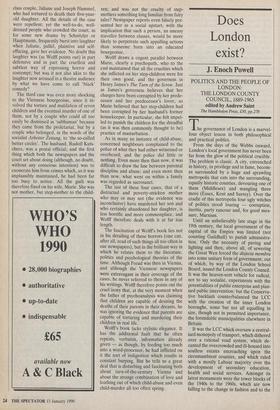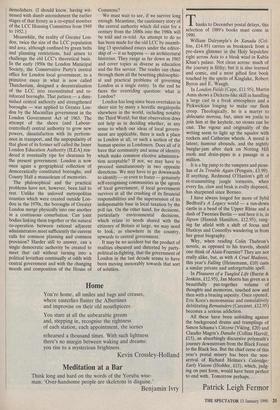Does London exist?
J. Enoch Powell
POLITICS AND THE PEOPLE OF LONDON: THE LONDON COUNTY COUNCIL, 1889-1965 edited by Andrew Saint The Hambledon Press, f30, pp.278 The governance of London is a marvel- lous object lesson in both philosophical and practical politics.
From the days of the Webbs onward, London's local government has never been ' far from the glow of the political crucible. The problem is classic. A city, entrenched in history, in privilege and in fame, becom- es surrounded by a huge and sprawling metropolis that eats into the surrounding, equally historic counties, devouring one of them (Middlesex) and mangling three more (Essex, Kent and Surrey). Over the cradle of this metropolis four ugly witches of politics stood louring — corruption, inertia, party rancour and, for good mea- sure, Marxism.
Until an unbelievably late stage in the 19th century, the local government of the capital of the Empire was limited (not counting Guildhall) to parish administra- tion. Only the necessity of paving and lighting and then, above all, of sewering the Great Wen forced the disjecta membra into some unitary form of government, out of which, by way of the London School Board, issued the London County Council. It was the heaven-sent vehicle for radical, not to say socialist, experiments with the potentialities of public enterprise and plan- ned public intervention; but the Conserva- tive backlash counterbalanced the LCC with the creation of the inner London boroughs, some but not all equalling in size, though not in permitted importance, the formidable municipalities elsewhere in Britain.
It was the LCC which oversaw a central- ised monopoly of transport, which dithered over a rational road system, which de- canted the overcrowded and ill-housed into soulless estates encroaching upon the circumambient counties, and which ruled with a mostly Labour majority over the development of secondary education, health and social services. Amongst its latest monuments were the tower blocks of the 1940s to the 1960s, which are now falling to the change in fashion and to the demolishers. (I should know, having wit- nessed with dumb astonishment the earlier stages of that frenzy as a co-opted member of the LCC Housing Committee from 1949 to 1952.) Meanwhile, the reality of Greater Lon- don, twice the size of the LCC population and area, although confined by green belts and planning restrictions, had arisen to challenge the old LCC's theoretical basis. In the early 1950s the London Municipal Society, the Conservative Party's central office for London local government, in a primitive essay in what is now called Thatcherism, designed a decentralisation of the LCC into reconstituted and re- inforced boroughs. That pattern — a dimi- nished central authority and strengthened boroughs — was applied to Greater Lon- don by the Macmillan government in the London Government Act of 1963. The attempt of the shorn (and Labour- controlled) central authority to grow new powers, dissatisfaction with its perform- ance in transport, and the unpopularity of that ghost of its former self called the Inner London Education Authority (ILEA) ren- dered it eventually ripe for clearance by the present government. London is now once again a geographical collection of democratically constituted boroughs, and County Hall a mausoleum of memories.
The philosophical and the practical problems have not, however, been laid to rest. Unlike the unloved metropolitan counties which were created outside Lon- don in the 1970s, the boroughs of Greater London merge physically into one another in a continuous conurbation. Can joint bodies linking them together or the natural co-operation between rational adjacent administrators meet sufficiently the current calls for common planning and common provision? Harder still to answer, can a single democratic authority be created to meet that call without turning into a political leviathan continually at odds with central government and with the changing moods and composition of the House of Commons?
We must wait to see, if we survive long enough. Meantime, the cautionary story of the central authority which did exist for a century from the 1880s into the 1980s will be told and re-told. An attempt to do so has been made for the old LCC by assemb- ling 13 specialised essays under the editor- ship of — it so happens — an architectural historian. They range as far down as 1965 and cover topics as diverse as education and the fire service. The reader can chase through them all the besetting philosophic- al and practical problems of governing London as a single entity. In the end he faces the overriding question: what is London?
London has long since been overtaken in sheer size by many a horrific megalopolis elsewhere in the world, including notably the Third World; but that observation does not help us in deciding whether, in any sense to which our ideas of local govern- ment are applicable, there is such a place as London at all, or such a section of the human species as Londoners. Does all of it have that community and sense of identity which make common elective administra- tion acceptable? If not, we may have to proceed simultaneously in two opposite directions. We may have to go downwards to identify — or even to foster — genuinely self-recognising communities as the agents of local government, if local government survives at all the crushing of its financial responsibilities and the supersession of its indispensable base in local taxation by the poll tax. On the other hand, for decisions, particularly environmental decisions, which relate to needs shared with the citizenry of Britain at large, we may need to look, as elsewhere in the country, upwards to central government.
It may be no accident but the product of realities obscured and distorted by party- political in-fighting, that the government of London in the last decade seems to have been moving inexorably towards that sort of solution. Thanks to December postal delays, this selection of 1989's books must come in 1990.
William Dalrymple's In Xanadu (Col- lins, £14.95) carries us breakneck from a pre-dawn glimmer in the Holy Sepulchre right across Asia to a bleak wind in Kubla Khan's palace. Not clean across: much of the journey is filthy; but it is also learned and comic, and a most gifted first book touched by the spirits of Kinglake, Robert Byron and E. Waugh.
In London Fields (Cape, £11.95), Martin Amis shows a Dickens-like skill in handling a large cast in a freak atmosphere and a Pickwickian longing to make our flesh creep. Theologically, he is a martyr to delectatio morosa, but, since we jostle to join him at the keyhole, no stones can be cast. The vigour and originality of the writing seem to light up the squalor with rockets and Catherine wheels. A moral is latent; humour abounds, and the nightly burglar-jam after dark on Notting Hill roofs and drain-pipes is a passage in a million.
It is a big jump to the vampires and piran- has of In Trouble Again (Penguin, £3.99). If anything, Redmond O'Hanlon's gift of re-transmitting jungle torments, when every fin, claw and beak is evilly disposed, has sharpened since Borneo.
I have always longed for more of Sybil Bedford's A Legacy world — a run-down castle in a bend of the Upper Rhine and a dash of Twenties Berlin — and here it is, in Jigsaw (Hamish Hamilton, £12.95), rang- ing far afield with a shift of focus and Huxleys and Connollys wandering in from her great biography.
Why, when reading Colin Thubron's novels, as opposed to his travels, should one think of Alain-Fournier? They are not really alike, but, as with A Cruel Madness, this year's Falling (Heinemann, £10) casts a similar private and unforgettable_ spell.
In Pleasures of a Tangled Life (Barrie & Jenkins, £12.95), Jan Morris has given us a beautifully put-together volume of thoughts and memories, touched now and then with a bracing asperity. Once opened, Eric Korn's monomaniac and cumulatively debilitating Remainders (Carcanet, £12.95) becomes a serious addiction.
All these have been unfolding against the background drums and tramplings of Simon Schama's Citizens (Viking, £20) and Claudio Magris's Danube (Collins Harvill, £15), an absorbingly discursive polymath's journey downstream from the Black Forest to the Black Sea. But the chief curse of this year's postal misery has been the non- arrival of Richard Holmes's Coleridge: Early Visions (Hodder, £15), which, judg- ing on past form, would have been perfect to end with. Tomorrow perhaps...
Patrick Leigh Fermor











































 Previous page
Previous page